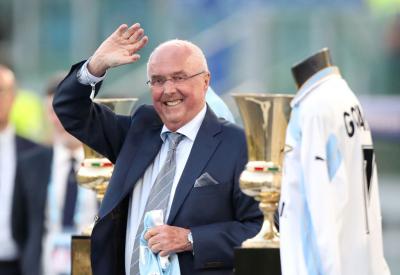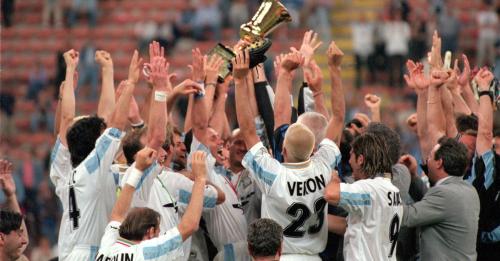How Sven-Göran Eriksson defined Italian football

ROME -- On the final day of the 1999/2000 Serie A season, Sven-Göran Eriksson led out his Lazio team with the weight of being nearly-rans deep in the team’s psyche. After a chaotic season, the Biancocelesti looked set to repeat the trick of 1998/99 and narrowly miss out on the Scudetto. But in a miraculous turn of fate, Lazio’s 3-0 win over Reggina on the final day was enough to snatch the title. Lazio’s fans could hardly believe it. Eriksson’s legacy as one of the great coaches in Italian football had finally been cemented.
The narrative was not supposed to go like this. With three games to play, Juventus led the league by five points. Going into the final day, Lazio’s hopes of ending the season as title winners were less than slim, trailing Juventus by two points as the Old Lady faced lowly Perugia in the final fixture. Lazio kept fading dreams alive with the win over Reggina but, in many respects, this story was as much about how Lazio won the Scudetto as how Juventus lost it. In Juventus’s final game, delayed by 80 minutes because of apocalyptic rain, Perugia somehow managed to score. Juventus failed to equalise and the title, finally, was handed over to Lazio.
Eriksson’s title triumph delivered the Roman club their first Scudetto since 1974. His tenure with Lazio had been one of the club’s most successful periods in their history, winning the Coppa Italia and Supercoppa in 1998, the UEFA Cup Winners’ Cup in 1999, and beating treble-winners Manchester United in the 1999 UEFA Super Cup. But the league title was still missing from a trophy cabinet made possible by the financial might of owner Sergio Cragnotti, the CEO of food brand Cirio later imprisoned for fraudulent bankruptcy. Lazio had missed out on the title by a point in 1999 and the Scudetto had been an elusive trophy for Eriksson, having seen his AS Roma side collapse in 1985/86 and lose the title by four points. But finally, in 1999/2000, the Swede took Lazio to the pinnacle of Italian football.
The success did not end there: Eriksson led Lazio to beating Marcello Lippi’s Internazionale team in the Coppa Italia final just days later. Speaking to The Coaches’ Voice in 2020, Eriksson explained that the Coppa Italia success was far from expected.
“I was speaking to Lippi and he said, ‘Now you’ve been winning everything, let us win.’ And I said to him, ‘I’m sorry, you will win because we haven’t really prepared the game because everything is crazy [after the Scudetto win]. But I remember the day before in the dressing room, I said [to the players], ‘If you are professional, you go out and you go out fighting’. And they did, and we won.”
“I think that was a really winning mentality,” he said. “I appreciate that win more than the league because of the way they did it.”
Critics will argue Eriksson was dealt a kind hand with one of the best Serie A squads of the period: Sinisa Mihajlovic, Alessandro Nesta, Diego Simeone, Juan Sebastian Veron, Marcelo Salas, Pavel Nedved, Roberto Mancini, a young Simone Inzaghi – all players who cemented their own Serie A legacies and many of whom have gone on to become top coaches. But Eriksson’s tactical imprint reinvigorated Lazio with his characteristic 4-4-2 setup, devastating on attacking transitions. His success with Lazio also owes to his ability to build a winning mentality. One of the few ruthless streaks Eriksson showed in his career was casting out fan-favourite Beppe Signori because of his negative attitude and poor work rate, provoking a fan protest at the training ground. But that is now largely forgotten because of subsequent success, as the Swede’s playing style and approach paid off.
On Tuesday, Eriksson’s family confirmed he had died at the age of 76. After being diagnosed with terminal pancreatic cancer, he told Swedish radio station P1 in January he had “best case a year” to live. He died at home near Sunne, Sweden.
Eriksson was born in Sunne in 1948 and brought up in Torsby. He made his debut in Swedish football at just 16 where he made his name and, after a year-long stint at Sifhälla, he joined Karlskoga in 1972. But Eriksson failed to fashion a successful playing career and retired in 1975 aged 27. Instead, his time as a defender was marked by formative years when he became influenced by English football’s 4-4-2 tactics, brought to Karlskoga by player-manager Tord Grip.
Eriksson furthered his relationship with Grip as his assistant at Degerfors in 1977, where he eventually got the managerial role on a permanent basis after Grip’s departure. His promising managerial pedigree led him to be appointed by IFK Göteborg, where he won the Swedish Cup, the domestic treble, and the UEFA Cup in 1982. Success in Sweden had boosted Eriksson’s stock and he was appointed the following season at Benfica for his first stint. Eriksson’s time at Benfica would set him on his journey to Italian football at Roma, Fiorentina, Sampdoria, and then Lazio.
The legacy Eriksson left at Lazio is even more remarkable given his stint at Roma a decade before. In his first managerial role in Italy, he inherited a talented team that had lost in the final of the European Cup to Liverpool the season before. In the 1984/85 season, Eriksson struggled as Roma finished seventh in the league. His second season was more successful, winning the Coppa Italia, but ended agonisingly in Serie A just one point off winners AC Milan.
The Swede took up the manager’s role at Fiorentina in 1987 but left after two seasons to return to Benfica. A Portuguese title later, Eriksson was tempted back to Italian football with Sampdoria in 1992, winning the Coppa Italia in 1994. Then, in 1997, he took up his position at Lazio. If winning the Scudetto with the Roman club was a twist of fate, so was Eriksson getting the Lazio job in the first place: he had initially agreed to join Blackburn Rovers instead but went back on an already-penned contract to stay in Italy. The rest, as they say, is history.
After a silverware-laden period, Lazio’s power waned as city rivals Roma did what they could not under Eriksson to beat the Biancocelesti to the Scudetto. Cragnotti compounded financial mistakes by eventually ripping up the title-winning team, as Nesta was sold to AC Milan, Veron departed for the Premier League, and Nedved joined Juventus. Eriksson was lured to take on the manager’s job with the England national team in 2001 to reignite a squad needing fresh ideas. The Swede said the opportunity to become England’s first ever foreign manager was an opportunity he could not turn down.
“You can't say ‘no' when you have been offered the job of manager of England. It is so big, and has so much prestige,” he said at his first press conference in 2001.
Eriksson took England to the quarter-finals at the World Cup in 2002, Euro 2004 and the 2006 World Cup, but failed to take a so-called golden generation to glory. Eriksson’s time in Serie A is not forgotten, but his legacy in Italy deserves far more attention than his relative achievements elsewhere.
Veron, speaking to Gazzetta dello Sport on Tuesday, said Eriksson’s impact was felt not just on the pitch, but also off it.
“I was 21 [when I arrived in Italy], I had never left Argentina and I needed a guide. He was that guide for me.”
“When you spoke to him, you understood immediately that he was listening to you and so, in that moment, you felt you were the only thing he was thinking about.”
“For me, he was the best [manager], how he welcomed me, how he understood me, how he improved me, how he made me become an important player. And remember, I was managed by the legend Sir Alex Ferguson at Manchester United. But Eriksson had something more: the human touch.”
A minute’s silence was held for Eriksson in Serie A and Serie B games on Monday night and will also be observed at the weekend. On Monday, Lazio released a message on X thanking Eriksson for “everything you did for us”, while Sampdoria reiterated on the same platform that the Swede “will never be forgotten.”
Eriksson may not have created dynasties of success with Italian clubs and may not be considered a tactical luminary in the same way as other Serie A managers, but his legacy in Italian football is long-lasting both as a coach and as a person. For many, the enduring memory of Eriksson will be his place in a golden Lazio period, culminating in that special 1999/2000 season, but also his refusal to let his team give up in the face of impossibility.
Sven Göran-Eriksson. Born 5 February 1948; died 26 August 2024.
bq

© COPYRIGHT ITALIAN INSIDER
UNAUTHORISED REPRODUCTION FORBIDDEN


